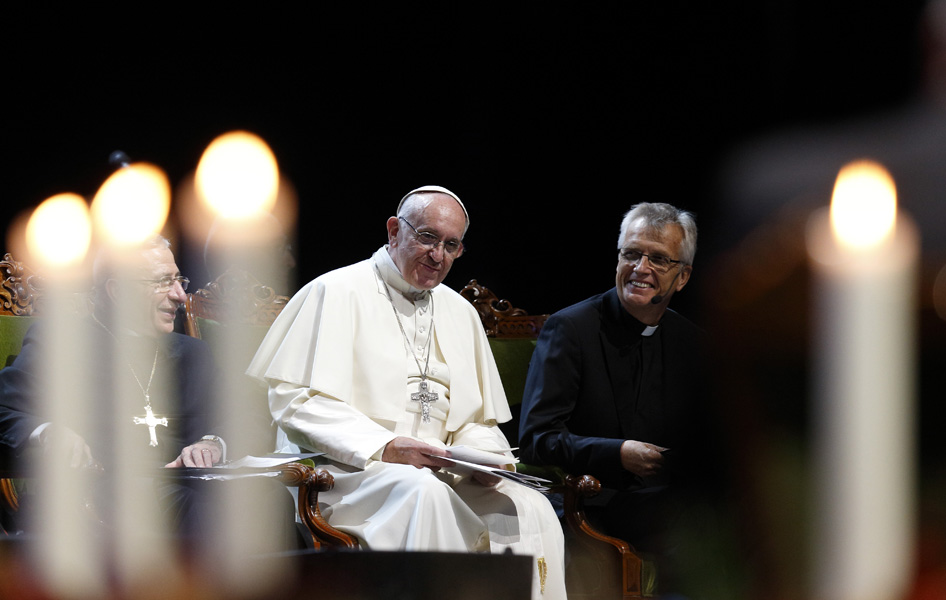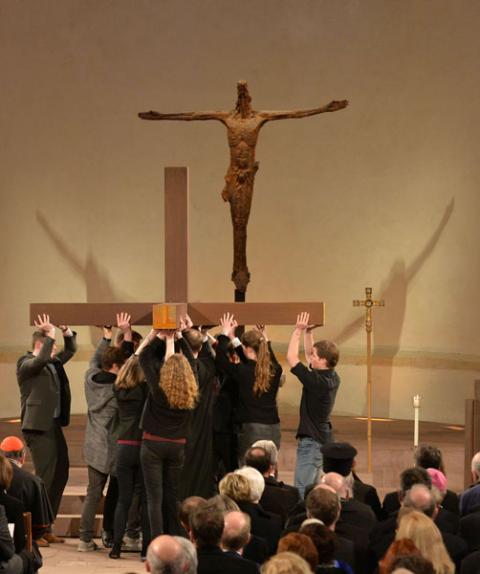
Bishop Munib Younan of the Evangelical Lutheran Church, president of the Lutheran World Federation, Pope Francis and Rev. Martin Junge, general secretary of the Lutheran World Federation, attend an ecumenical event at the Malmo Arena in Malmo, Sweden, Oct. 31, 2016. The event opened a year marking the 2017 commemoration of the 500th anniversary of the Protestant Reformation. (CNS/Paul Haring)
From the distance of 500 years, the Protestant Reformation, which began Oct. 31, 1517, seems increasingly to have been both avoidable and regrettable.
Had Martin Luther and the Catholic Church then both been more willing to listen, acknowledge error, remove ego from the equation and, in humility, pay attention to the sometimes gentle, often subtle, never coercive Holy Spirit, perhaps the Western church might have held together.
But we cannot change history. The best we can do is change the present and try to shape the future. That seems to be what's happening between Catholics and Protestants at the upper reaches of authority. Whether it will make any difference to people in the pews is so far unknowable, but we can hope.
The most recent evidence that Catholics and Protestants sometimes are singing from the same page came July 5 at a ceremony in Wittenberg, Germany, where Luther once nailed his "95 theses" to the cathedral door in hopes of a debate that would lead to fixing things he found wrong in the church. (He may have mailed in the theses, but let's go with the legend.)
At that ceremony, the World Communion of Reformed Churches (in the U.S. think Presbyterians and the United Church of Christ, among others) said it was in harmony with a document (the Joint Declaration on the Doctrine of Justification) that the Catholic Church and the Lutheran World Federation signed in 1999.
In announcing its agreement with that document, the organization of Reformed churches issued its own statement highlighting why it decided the Lutherans and Catholics got it right.
Advertisement

Young people lift up a cross during an ecumenical service March 11 at St. Michael's Church in Hildesheim, Germany. (CNS/Jens Schulze, pool via EPA)
In typical church document language — meaning stilted and extraordinarily careful — the Reformed Churches declared this: "We rejoice together that the historical doctrinal differences on the doctrine of justification no longer divide us, and we experience this as a moment of self-examination, conversion and new commitment to one another manifesting new unity and advancing our common witness for peace and justice."
So it seems that the Catholic and Protestant branches of Christianity increasingly are singing "Kumbaya" together around the campfire. Are they? And, if so, what does it mean?
Well, as a longtime advocate for both interfaith and ecumenical dialogue and understanding, I hope this is another step toward healing the 500-year-old divide. But I doubt that it changes much inside the walls of Catholic or Protestant churches.
For one thing, I bet you could go to every Catholic and Protestant congregation in the U.S. this Sunday and you wouldn't find more than .005 percent of the people there who've even heard about what the Reformed churches said in July. And I'd be surprised if you could find more than 2 percent of people there who had heard of the 1999 Catholic-Lutheran agreement.
Probably the best to be hoped for would be to find that some folks at those worship services will know that Luther was against the Catholic Church selling indulgences and was in favor of the idea that people are saved by grace through faith.
After that it will be on to such topics as the miserable coffee in the fellowship hall, the upcoming annual stewardship campaign, the need to recruit more Sunday school teachers and the terrific solo at today's service.
However important the theological battles were 500 years ago — or even 1,000 years ago in the Great Schism — the sad truth today is that many people of faith are biblically and theologically illiterate. They're more interested in how to live a moral life in an immoral age, and that's not a bad thing.
In other words, they care much less about "works righteousness" than they do keeping their ethical balance at work and home.
So good for some Protestants and the Vatican for agreeing about some difficult matters of angels dancing on heads of pins. But let's also focus on reforming the companies making those pins so they don't exploit workers.
[Bill Tammeus, a Presbyterian elder and former award-winning Faith columnist for The Kansas City Star, writes the daily "Faith Matters" blog for The Star's Web site and a column for The Presbyterian Outlook. His latest book is The Value of Doubt: Why Unanswered Questions, Not Unquestioned Answers, Build Faith . E-mail him at wtammeus@gmail.com.]







